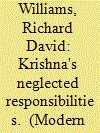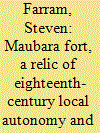| Srl | Item |
| 1 |
ID:
146834


|
|
|
|
|
| Summary/Abstract |
This article examines the literary strategies employed by a devotional poet who wrote about recent events in the eighteenth century, in order to shed light on contemporary notions of social responsibility. Taking the poetic treatment of Ahmad Shah Abdali's invasion of North India and the sacking of Vrindavan in 1757 as its primary focus, the article will discuss how political and theological understandings of lordship converged at a popular level, such that a deity could be called to account as a neglectful landlord as well as venerated in a bhakti context. It examines the redaction of tropes inherited from both vaisnava literature and late Mughal ethical thought, and considers the parallels between the Harikala Beli, a Braj Bhasha poem, and immediately contemporary developments in Urdu literature, particularly the shahr ashob genre. As such, it uses poetic responses to traumatic events as a guide to the interaction between multiple intellectual systems concerned with human and divine expectations and obligations.
|
|
|
|
|
|
|
|
|
|
|
|
|
|
|
|
| 2 |
ID:
167229


|
|
|
|
|
| Summary/Abstract |
The European rivals for colonial domination on the island of Timor in the eighteenth century relied on alliances with the many Timorese principalities for influence outside their own small settlements; the Dutch at Kupang and the Portuguese at Lifau. The central Timorese principality of Maubara sought an alliance with the Dutch in 1755, resulting in the building there of a Dutch fort a few years later. The Dutch had hoped that this alliance would facilitate extension of their authority in the eastern districts. However, the Portuguese moved their capital to Dili in 1769 and Maubara was soon surrounded by Portuguese allies. The Dutch continued to supply Maubara with sporadic support, but finally surrendered it to the Portuguese in 1861. This article examines the Dutch claim to Maubara, the circumstances surrounding the erection of the fort, and the reasons for its later abandonment to the Portuguese.
|
|
|
|
|
|
|
|
|
|
|
|
|
|
|
|